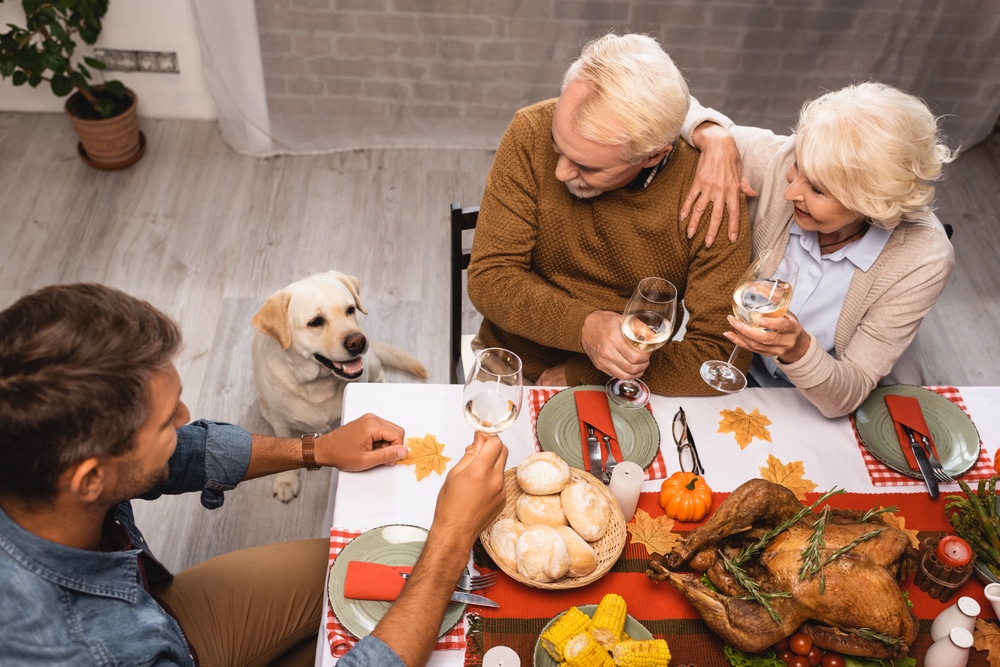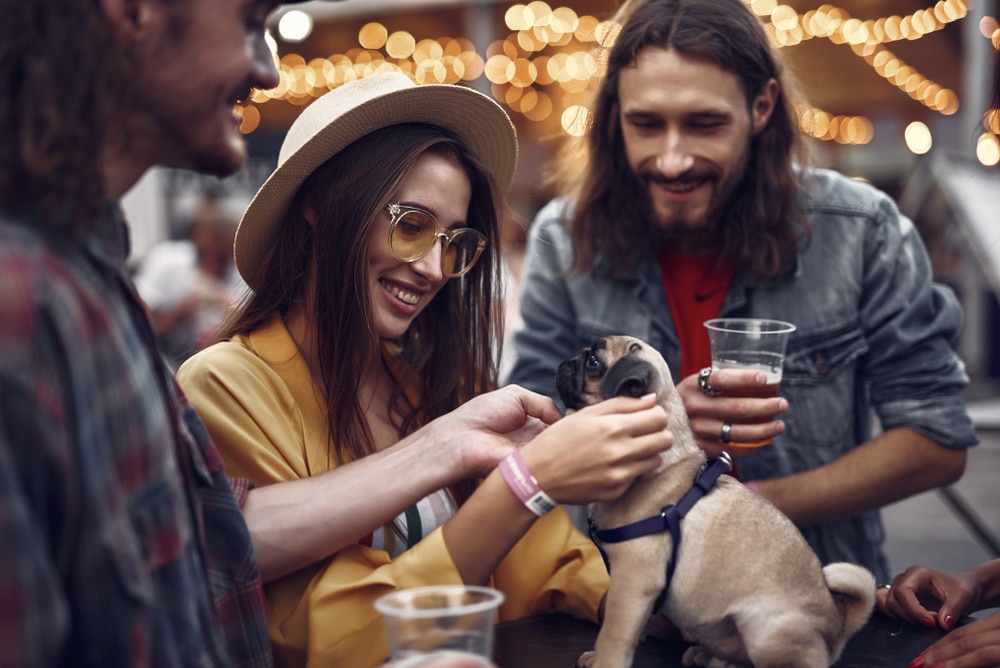Many dog owners are curious whether their furry friend can drink alcohol or not. Even though dogs often despise the smell of alcohol, they can be tempted to try the new apple cider sitting on your coffee table due to its sweet flavor. But can dogs drink alcohol, and how long does it take for a dog to process alcohol?
Alcohol is absorbed into a dog’s body in less than 30 minutes, and they will start showing symptoms of alcohol toxicity 30 to 60 minutes after the alcohol intake. Dogs should never be allowed to drink alcohol. If they do, they should be taken to the vet right away.
Table of Contents
Can Dogs Drink Alcohol?

No, dogs and alcohol do not get along. Alcohol is toxic to dogs, which can lead to severe health problems or even (what everyone is scared to utter out loud) death.
While you may find it amusing to allow your pup just a taste of your favorite alcoholic beverage, DON’T! It’s not a good idea and even a small lick of alcohol is harmful to a dog. No matter the situation, or the amount of alcohol you plan on giving your furry friend, it should go without saying that offering your dog alcohol is entirely unacceptable.
Alcohol has the same effect on a dog’s liver and brain as it does on humans. But because dogs are much smaller than humans, they are more susceptible to the toxic effects of alcohol.
How Long After Drinking Does Your Dog Start to Process Alcohol?
It takes around 30 to 60 minutes for the alcohol to enter the dog’s system, sometimes even sooner. This is especially true if they drank on an empty stomach. Once in the system, your dog will start to show the effects of acute alcohol intoxication.
What Is Alcohol Poisoning?
When alcohol poisoning occurs, the gastrointestinal tract immediately absorbs the toxic substance. Dogs can experience alcohol poisoning through ingestion, though it can occur from dermal exposure too (meaning skin exposure). In addition, overdosing the dog with alcohol-based flea sprays also causes toxicity (we recommend avoiding these anyway).
Products like rubbing alcohol, or any alcoholic beverage for that matter, can lead to alcohol poisoning. Even though in most cases, alcohol poisoning results from alcohol ingestion when alcohol is left unattended around a dog, it can occur by ingesting hand sanitizers or antifreeze too (products that have alcohol in their ingredient list).
The American Kennel Club has come up with the correct ethanol concentration in household products. So, be sure to check it out.
Symptoms of Alcohol Toxicity in Dogs
We undoubtedly love our dogs, but unfortunately, accidents happen.
The weight, length, and age of the dog, along with the amount of alcohol in an alcoholic beverage, are all factors that affect how your dog will react to alcohol.
In acute alcohol poisoning, there is this period of time when our furry best friend shows signs of excitement followed by whining and agitation. Not long after, more serious symptoms will come to the surface, such as:
- Enhanced inquisitiveness and loss of motor coordination (the most frequently observed symptoms)
- Vomiting
- Excessive thirst or dehydration
- Hypothermia (low body temperature)
- Hypoglycemia (extremely low blood sugar)
- Hypotension (low blood pressure)
- Lethargy
- Diarrhea
- Frequent urination
- Diarrhea
- Seizures
- Breathing problems
We certainly don’t want you to wait till the last symptom when the body starts failing due to respiratory problems. So, if you notice any of the above signs or if you think your dog has drunk some alcohol, immediately seek veterinary help or call a pet poison hotline to establish if any further treatment is needed.
What To Do If Your Dog Drinks Alcohol?
If despite your best precautions, your dog has found its way to taking a sip from the wine glass on the coffee table, the first thing to do is to alert your veterinarian (or emergency veterinarian or animal poison control if your vet isn’t available). Then, listen to their advice and the steps you’ll need to take.
Don’t be alarmed if the veterinarian asks for an immediate check-up–it’s just a precautionary measure and a chance to act on the spot to prevent any severe health problems or even death.
Diagnosis Of Alcohol Poisoning In Dogs
A veterinarian will diagnose alcohol poisoning based on your dog’s symptoms. Also, they may do a blood test to measure your dog’s blood alcohol level. A blood test doesn’t only assess alcohol intake but also assesses liver and kidney function.
In most cases, an expert can determine alcohol poisoning based on the dog’s breath smell. Unfortunately, the dog’s breath will often smell exactly like the alcoholic beverage they so desperately tried to devour.
Treatment Of Alcohol Poisoning In Dogs
If your vet diagnoses your dog with alcohol poisoning, you will need to hospitalize your dog for intensive care. There, your vet will place your furry friend on a fluid drip. IV (intravenous) fluids consisting of electrolytes will help the kidneys and urine outflow return to normal. In addition, activated charcoal will help absorb any remaining toxins in their system to prevent dehydration.
The veterinarian will also monitor your dog’s heart rate and respiration and provide supportive care as needed.
Is Alcohol Intake Fatal To Dogs?
Sadly, yes. Alcohol intake can be fatal to dogs, which, if not treated immediately, leads to respiratory problems where the dog falls into a coma followed by death from respiratory paralysis.
Frequently Asked Questions
Here’s some more information for you about dogs and alcohol. The more you know about this topic the better.
How Long Does Alcohol Stay In A Dog’s System?
While it takes as little as 30 minutes for alcohol to enter a dog’s body, the alcohol stays in its system for more than six hours.
Can A Dog’s Body Process Alcohol Same As The Human Body?
No, a dog’s body processes alcohol differently than the human body. That is because dogs are much more sensitive to the toxic effects of alcohol than humans because of their weight, age, and size.
Bottom Line: How Long Does It Take For A Dog To Process Alcohol?
It takes approximately 30 minutes to an hour for a dog to process one ounce of alcohol. However, depending on the dog’s size, age, and weight, it may take longer or shorter for the alcohol to work its way through its system. Even if you cannot completely control your pet’s movements, environment, and the things they ingest, a little more education, awareness, and proactive work is the best way to keep your dog safe and sound.
If you think your dog has ingested alcohol, it is essential to seek veterinary care immediately, as alcohol poisoning can be fatal. Remember, a minute can be worth your dog’s life.
So, why are you interested in this topic? Let us know your thoughts and why in the comments below!
